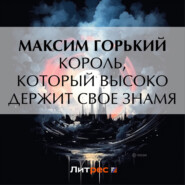По всем вопросам обращайтесь на: info@litportal.ru
(©) 2003-2024.
✖
The Man Who Was Afraid
Настройки чтения
Размер шрифта
Высота строк
Поля
“And where am I to rest?” Foma muttered again. “Whither shall I fling myself?” And he remained as though petrified in a broken, uncomfortable attitude, all distorted, with an expression of pain on his face.
Mayakin rose from his seat and went to the cabin, saying softly:
“Keep an eye on him, he might fling himself overboard.”
“I am sorry for the fellow,” said Bobrov, looking at Yakov Tarasovich as he departed.
“No one is to blame for his madness,” replied Reznikov, morosely.
“And Yakov,” whispered Zubov, nodding his head in the direction of Mayakin.
“What about Yakov? He loses nothing through it.”
“Yes, now he’ll, ha, ha!”
“He’ll be his guardian, ha, ha, ha!”
Their quiet laughter and whisper mingled with the groaning of the engine did not seem to reach Foma’s ear. Motionlessly he stared into the distance before him with a dim look, and only his lips were slightly quivering.
“His son has returned,” whispered Bobrov.
“I know his son,” said Yashchurov. “I met him in Perm.”
“What sort of a man is he?”
“A business-like, clever fellow.”
“Is that so?”
“He manages a big business in Oosolye.”
“Consequently Yakov does not need this one. Yes. So that’s it.”
“Look, he’s weeping!”
“Oh?”
Foma was sitting leaning against the back of the chair, and drooping his head on the shoulder. His eyes were shut, and from under his eyelids tears were trickling one after another. They coursed down his cheeks into his moustache. Foma’s lips quivered convulsively, and the tears fell from his moustache upon his breast. He was silent and motionless, only his chest heaved unevenly, and with difficulty. The merchants looked at his pale, tear-stained face, grown lean with suffering, with the corners of his lips lowered downward, and walked away from him quietly and mutely.
And then Foma remained alone, with his hands tied behind his back, sitting at the table which was covered with dirty dishes and different remains of the feast. At times he slowly opened his heavy, swollen eyelids, and his eyes, through tears, looked dimly and mournfully at the table where everything was dirty, upset, ruined.
.......
Three years have passed.
About a year ago Yakov Tarasovich Mayakin died. He died in full consciousness, and remained true to himself; a few hours before his death he said to his son, daughter and son-in-law:
“Well, children, live in richness! Yakov has tasted everything, so now it is time for Yakov to go. You see, I am dying, yet I am not despondent; and the Lord will set that down to my credit. I have bothered Him, the Most Gracious One, with jests only, but never with moans and complaints! Oh Lord! I am glad that I have lived with understanding through Thy mercy! Farewell, my children. Live in harmony, and don’t philosophize too much. Know this, not he is holy who hides himself from sin and lies calm. With cowardice you cannot defend yourself against sin, thus also says the parable of the talents. But he who wants to attain his goal in life fears not sin. God will pardon him an error. God has appointed man as the builder of life, but has not endowed him with too much wisdom. Consequently, He will not call in his outstanding debts severely. For He is holy and most merciful.”
He died after a short but very painful agony.
Yozhov was for some reason or other banished from the town soon after the occurrence on the steamer.
A great commercial house sprang up in the town under the firm-name of “Taras Mayakin & African Smolin.”
Nothing had been heard of Foma during these three years. It was rumoured that upon his discharge from the asylum Mayakin had sent him away to some relatives of his mother in the Ural.
Not long ago Foma appeared in the streets of the town. He is worn out, shabby and half-witted. Almost always intoxicated, he appears now gloomy, with knitted brow, and with head bent down on his breast, now smiling the pitiful and melancholy smile of a silly fanatic. Sometimes he is turbulent, but that happens rarely. He lives with his foster-sister in a little wing in the yard. His acquaintances among the merchants and citizens often ridicule him. As Foma walks along the street, suddenly someone shouts to him:
“Eh, you prophet, come here!”
Yet he rarely goes to those who call him; he shuns people and does not care to speak with them. But when he does approach them they say to him:
“Well, tell us something about doomsday, won’t you? Ha, ha, ha! Prophet!”
Mayakin rose from his seat and went to the cabin, saying softly:
“Keep an eye on him, he might fling himself overboard.”
“I am sorry for the fellow,” said Bobrov, looking at Yakov Tarasovich as he departed.
“No one is to blame for his madness,” replied Reznikov, morosely.
“And Yakov,” whispered Zubov, nodding his head in the direction of Mayakin.
“What about Yakov? He loses nothing through it.”
“Yes, now he’ll, ha, ha!”
“He’ll be his guardian, ha, ha, ha!”
Their quiet laughter and whisper mingled with the groaning of the engine did not seem to reach Foma’s ear. Motionlessly he stared into the distance before him with a dim look, and only his lips were slightly quivering.
“His son has returned,” whispered Bobrov.
“I know his son,” said Yashchurov. “I met him in Perm.”
“What sort of a man is he?”
“A business-like, clever fellow.”
“Is that so?”
“He manages a big business in Oosolye.”
“Consequently Yakov does not need this one. Yes. So that’s it.”
“Look, he’s weeping!”
“Oh?”
Foma was sitting leaning against the back of the chair, and drooping his head on the shoulder. His eyes were shut, and from under his eyelids tears were trickling one after another. They coursed down his cheeks into his moustache. Foma’s lips quivered convulsively, and the tears fell from his moustache upon his breast. He was silent and motionless, only his chest heaved unevenly, and with difficulty. The merchants looked at his pale, tear-stained face, grown lean with suffering, with the corners of his lips lowered downward, and walked away from him quietly and mutely.
And then Foma remained alone, with his hands tied behind his back, sitting at the table which was covered with dirty dishes and different remains of the feast. At times he slowly opened his heavy, swollen eyelids, and his eyes, through tears, looked dimly and mournfully at the table where everything was dirty, upset, ruined.
.......
Three years have passed.
About a year ago Yakov Tarasovich Mayakin died. He died in full consciousness, and remained true to himself; a few hours before his death he said to his son, daughter and son-in-law:
“Well, children, live in richness! Yakov has tasted everything, so now it is time for Yakov to go. You see, I am dying, yet I am not despondent; and the Lord will set that down to my credit. I have bothered Him, the Most Gracious One, with jests only, but never with moans and complaints! Oh Lord! I am glad that I have lived with understanding through Thy mercy! Farewell, my children. Live in harmony, and don’t philosophize too much. Know this, not he is holy who hides himself from sin and lies calm. With cowardice you cannot defend yourself against sin, thus also says the parable of the talents. But he who wants to attain his goal in life fears not sin. God will pardon him an error. God has appointed man as the builder of life, but has not endowed him with too much wisdom. Consequently, He will not call in his outstanding debts severely. For He is holy and most merciful.”
He died after a short but very painful agony.
Yozhov was for some reason or other banished from the town soon after the occurrence on the steamer.
A great commercial house sprang up in the town under the firm-name of “Taras Mayakin & African Smolin.”
Nothing had been heard of Foma during these three years. It was rumoured that upon his discharge from the asylum Mayakin had sent him away to some relatives of his mother in the Ural.
Not long ago Foma appeared in the streets of the town. He is worn out, shabby and half-witted. Almost always intoxicated, he appears now gloomy, with knitted brow, and with head bent down on his breast, now smiling the pitiful and melancholy smile of a silly fanatic. Sometimes he is turbulent, but that happens rarely. He lives with his foster-sister in a little wing in the yard. His acquaintances among the merchants and citizens often ridicule him. As Foma walks along the street, suddenly someone shouts to him:
“Eh, you prophet, come here!”
Yet he rarely goes to those who call him; he shuns people and does not care to speak with them. But when he does approach them they say to him:
“Well, tell us something about doomsday, won’t you? Ha, ha, ha! Prophet!”

















